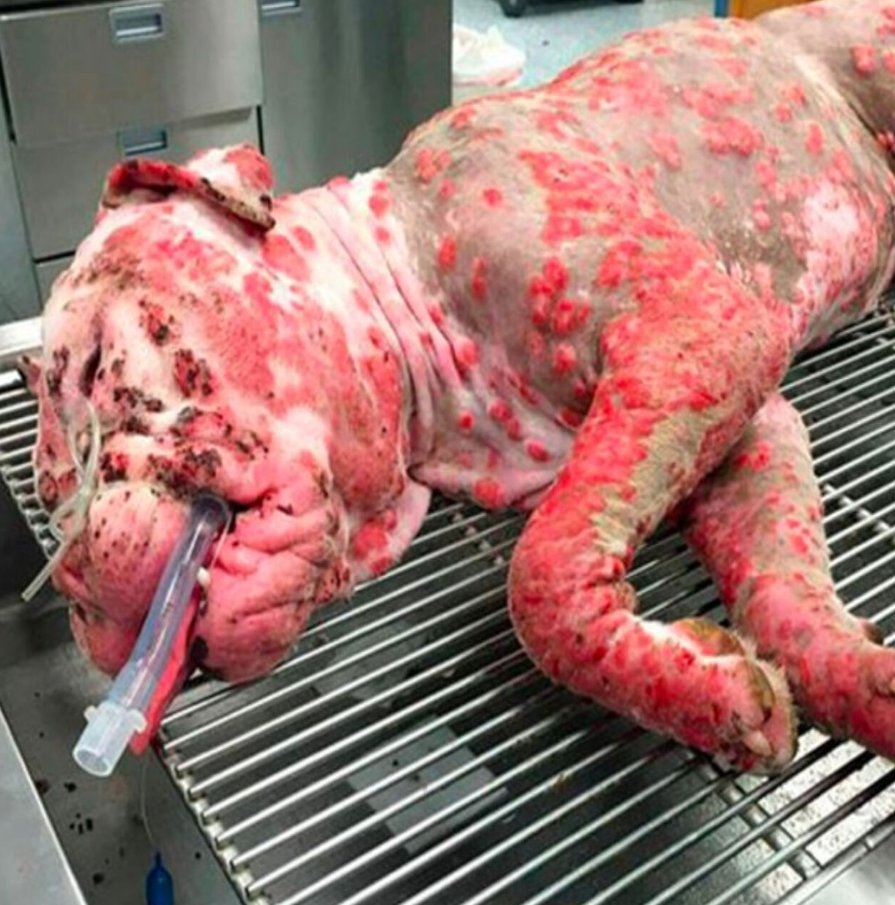Photos of a nursing dog that was dumped and chained to a fence in County Roscommon, Ireland, are being shared by devastated dog lovers around the world.
The 2-year-old lurcher was tightly chained to a metal fence post by her collar in a remote field. The dog had been abandoned along with six of her puppies, which were so young they had yet to open their eyes. They were left without food and water; the mother, despite being restrained by the chain pulling at her collar, was attempting to nurse her babies.

According to the Irish Times, the vulnerable, nursing mom and her puppies were discovered by a passerby in a field beside the small town of Elphin on Nov. 6, 2019. The person promptly called for help. The mother and her pups were taken to a nearly vet clinic working on behalf of the Irish Society for the Prevention of Cruelty to Animals (ISPCA).
Nobody knew how long the family of seven had been stranded there. According to the Daily Mail, rescuers speculated that the mother and her pups were abandoned soon after the mother gave birth.
Hugh O’Toole, manager of the ISPCA center, commented: “[L]eaving a young dog only two years old tied up without water, food, or shelter most definitely put her [life at risk] along with her young puppies.”

“With the recent level of rainfall and cold weather this week,” he added, “the outcome could have been very different and I’m happy we were alerted so we could help them.”
The seven dogs were taken to the ISPCA’s national animal center in County Longford for urgent veterinary assessment. Mercifully, neither mom nor her babies suffered any major health issues, except for having had to endure their period of hunger and the biting cold.

Taking on a family of seven was no mean feat for the ISPCA.
“Our centers are constantly full to capacity and with very limited resources,” O’Toole explained. “We sometimes have had to use private boarding kennels to help the number of animals waiting to come in […] It can also take time to find good, responsible homes for the many animals in our care.
“I don’t understand how anyone can think it is okay to leave a dog tied to a gate to nurse her puppies,” he continued, echoing the outrage of animal lovers everywhere.

When the ISPCA posted pictures of the sweet, stoic lurcher and her pups on Facebook, comments flooded in. “This has to be the saddest picture I have ever seen and that is saying a lot with so much cruelty around us,” one person wrote, “this is disgraceful, poor mama dog trying to protect her babies, it’s just shocking.”
“Until we have harsh laws and harsher penalties for animal abuse this type of horrific neglect will continue,” another Facebook user contributed, adding “enough is enough. Politicians need to step up and re-write the animal welfare laws just as other counties have done.”

he mother dog, who was named Emmy Lou by her rescuers, was not microchipped and could not be traced back to an owner despite the fact that microchipping is a legal requirement in the United Kingdom.
The puppies were named Billy Ray, Dixie, Dolly, Dotty, June, and Patsy, and all will remain with the ISPCA until January 2020, when they will be old enough to go up for adoption.
The ISPCA, much like other animal welfare initiatives around the world, continues to urge animal owners to spay and neuter their pets in order to help reduce the number of unwanted animals in the population.
For Emmy Lou and her babies, though, a good Samaritan out walking on a cold November day in the Irish countryside was their good fortune, and may continue to be so for years to come.
The weeks that followed their rescue brought a whirlwind of change for Emmy Lou and her six little ones. Once weak and frightened, the mother lurcher began to show signs of recovery in the warmth and safety of the ISPCA’s national animal center. With consistent meals, medical care, and gentle human interaction, she began to shed her anxious demeanor and embrace the kindness that surrounded her.
Her puppies, tiny and fragile at the time of their rescue, began to grow stronger each day. Their eyes soon opened to reveal bright, curious expressions. Under the constant care of the ISPCA staff and volunteers, they were given a clean, warm environment to thrive in. Play sessions and gentle socialization helped prepare them for the possibility of future families—something they had once never had a chance to dream of.
Emmy Lou, initially wary of humans, began to form bonds with the caregivers at the center. She would greet familiar faces with a cautious wag of her tail and gradually began to seek out affection. It was clear that beneath the trauma she had endured, Emmy Lou had a gentle and forgiving spirit. Her devotion to her puppies never wavered—she nursed them, kept them warm, and remained fiercely protective, even while recovering herself.
In the months that followed, the ISPCA shared regular updates on social media, chronicling the progress of the canine family. Each photo of Emmy Lou curled around her sleeping pups or watching over them as they played tugged at the hearts of thousands. The posts continued to draw comments and messages from people around the world—some offering donations, others pledging to adopt when the puppies were old enough.
As January approached, the puppies were evaluated for adoption. Each had developed unique personalities: Billy Ray was playful and bold, Dixie had a shy streak but adored cuddles, Dolly and Dotty were nearly inseparable, while June and Patsy often led their siblings in mischievous explorations around the play yard. The ISPCA worked diligently to ensure that each puppy would be matched with a home that could offer patience, stability, and love.
Emmy Lou’s future, too, was being carefully considered. The staff at the ISPCA knew that her ideal forever home would need to understand her past and offer the space and time she needed to fully trust again. Fortunately, a couple from nearby County Leitrim, longtime supporters of the ISPCA, came forward. They had recently lost an elderly rescue dog and felt drawn to Emmy Lou’s story. After several visits to the center to build rapport, Emmy Lou responded to them with growing comfort—accepting treats, wagging her tail, and eventually resting her head on the wife’s lap.
It was clear a bond had formed.
In late January, Emmy Lou was officially adopted. Her departure from the center was both joyous and emotional for the staff who had nurtured her through her darkest hours. “She’s going to a home where she will be cherished,” one volunteer said tearfully. “After what she went through, she deserves nothing less.”
Each of the puppies was adopted soon after. The ISPCA shared photos of the pups in their new homes—curled up on soft couches, romping in backyards, and being cuddled by children. Updates continued to pour in from their adoptive families, who expressed amazement at how loving and affectionate the pups were despite their traumatic beginnings.
The story of Emmy Lou and her puppies did more than just tug at heartstrings; it served as a powerful reminder of the importance of vigilance and compassion in animal welfare. Several animal rights organizations in Ireland cited the case in renewed calls for tougher enforcement of microchipping laws and harsher penalties for abandonment and neglect.
Moreover, public interest in adoption spiked. The ISPCA reported a notable increase in adoption inquiries and applications in the months following the viral spread of Emmy Lou’s story. People were inspired not only to adopt but also to donate, volunteer, and advocate. The ripple effect of one rescued family spread far beyond County Roscommon.
For Emmy Lou, life had changed in every possible way. Once abandoned and chained, she now spent her days lounging by the fireplace in her new home, her soft bed a stark contrast to the cold ground of the field she was once left in. She would accompany her new owners on gentle walks, often stopping to sniff curiously or watch the world go by. The trauma hadn’t disappeared, but it had softened, replaced slowly by trust and peace.
Her adoptive family described her as “an old soul in a young body”—grateful, protective, and remarkably attuned to the emotions of those around her. “She’s still cautious around strangers,” her new owner shared, “but with us, she’s nothing but love. It’s like she knows she’s safe now.”
As for her puppies, each one grew into a spirited, affectionate dog with their own joyful lives. Their resilience was nothing short of remarkable, and it stood as a testament to the powerful bond between mother and child—and the life-saving potential of rescue.
Years from now, Emmy Lou’s story will still be remembered. Not just because it began in tragedy, but because it ended in hope. The images that once brought tears—of a mother chained and helpless—have been replaced by new ones: of Emmy Lou nestled in a cozy bed, her eyes finally at peace; of her puppies bounding through gardens and snoozing in sunlit corners of homes that love them.
In the eyes of many, Emmy Lou became a symbol—not only of survival but of the incredible things that can happen when kindness meets action. She was saved by chance, healed by care, and given a future by love. And for those who followed her journey, she will always be remembered as the mother who never gave up, and the dog who proved that even in the worst of circumstances, hope can bloom.












